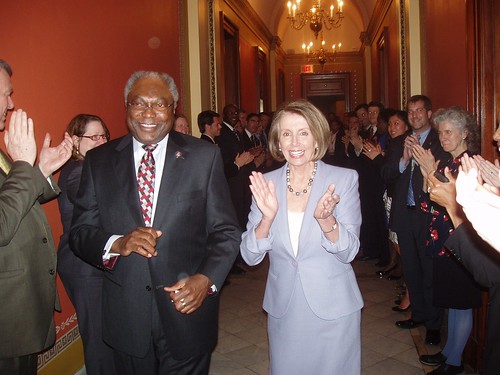
Last night, health care reform passed the house, and will be taken up by the Senate later this week.
In the end, I was glad to see it pass. As crappy as much of it is policy wise (as we've discussed over the months), giving health care to 30 million people who didn't have it is an impressive achievement. With further organizing such as Grayson's medicare buy-in bill and Harry Reid's talk of a future vote on the public option, there is hope that we can turn this bill into real reform going forward.
My feeling on the bill is just about summed up by JN's line that this improves the status quo, but in the worst way possible. That may hardly sound like an endorsement, but that's about where I'm at mentally after watching 11 months of a Democratic president and a Democratic congress trying to pass Mitt Romney's health care bill.
If you'd like to delve into the debate a bit further, here are two additional pieces that make the cases for and against the bill.
Jane Hamsher's statement against the bill makes a very good case, and brings up some often ignored points about choice:
The country turned an important corner last night when Congress affirmed the moral imperative of providing quality health care to more Americans and passed the President’s sweeping health insurance reform bill. It is to President Obama’s credit that he was willing to commit his office to such a challenge when others before him had failed.As for the pro side, Noam Chomsky recently said he'd "hold his nose and vote yes", making some very good points, and emphasizing the importance of universality:
But this is not health care reform, and the task of providing health care that Americans can afford is still before us. Too much was sacrificed to corporate interests in the sausage-making process. Rather than address the fundamental flaws in our health care system, we applied a giant band-aid. This health care bill does not come close to doing all that needs to be done to meet the needs of our citizens and our businesses as we retool our economy for the 21st century.
There are many good and praise-worthy things in this health care bill: help for those with pre-existing conditions, guaranteed coverage for children, money for community health centers, and expansion of Medicaid and SCHIP. But there is also cause for serious concern. Never before has the government mandated that its citizens pay directly to private corporations almost as much as they do in federal taxes, especially when those corporations have been granted unregulated monopolies.
"The United States’ health care system is so dysfunctional it has about twice the health care costs of comparable countries and some of the worst outcomes," Chomsky told Raw Story. "This bill continues with that."Obama will sign the Senate Bill that passed the house tomorrow, and then then Senate will pass the reconciliation fix over the next few weeks/months/years, since it's never clear long it takes that stupid institution to do even the simplest tasks.
The decades-long critic of corporate power alleged that premiums won't stop rising as the package is designed in no small part to funnel money into the pockets of the health care industry. "The bill gives away a lot to insurance companies and big pharmaceutical corporations," he said.
. . .
"If I were in Congress," he said, "I’d probably hold my nose and vote for it, because the alternative of not passing it is worse, bad as this bill is. Unfortunately, that’s the reality."
"If it fails, it wouldn’t put even limited constraints on insurance companies," he explained, noting that the bill is "at least has some steps towards barring the withholding of policies from people with prior disabilities." The consumer protections from dodgy insurance practices are among the bill's most popular components.
The mandate to purchase insurance has been a central qualm of progressives and conservatives opposed to the effort. Chomsky, while admitting it’s a boon to insurance companies, called it a "step toward universality," asserting that "without some kind of mandatory coverage, nothing is going to work at all."
And one last reminder of what should have been been done in this bill and what is possible to accomplish in the future: (CNN Poll, via Glenn Greenwald)

To paraphrase 6.54 , we can (and will) do better.

I'm going to do you a favor and go over your math before our friends at resist.net do.
ReplyDeletefavor (from question 20) - 39%
Oppose (not liberal enough) - 13 %
Favor or oppose for not being liberal enough = 39% + 13%, or 52% (not 62... aren't typos a bitch?)
Still a majority, but given how accurate polls are, 2% isn't a huge margin. With a different sample, you might have gotten 49%. Not to mention, that says nothing about which numbers would change if you made it more liberal. Obviously "oppose, not liberal enough" should go down. But we don't know if that would be balanced by an increase in "oppose, too liberal". Given that "oppose, too liberal" was over twice as high as "not liberal enough" to start with, one would expect a further shift to the left to loose you more votes than it gains. Also, since your "yes" vote is likely the "favor" and "doesn't do as much as I'd like" pools combined, this is probably very close to as liberal as they can get the bill and still have it be popular.
Still, I'd really rather that their solution to getting more people to have health insurance wasn't to make not having it illegal. If that works, the nations problems would be really easy to solve.
High unemployment? It's now illegal to be unemployed. So among non-felons, unemployment is 0%. Another victory for the legislative process!
@jaypop thanks for catching my typo.
ReplyDelete